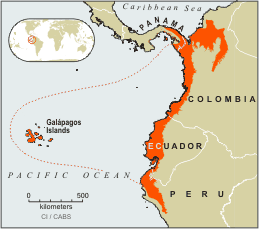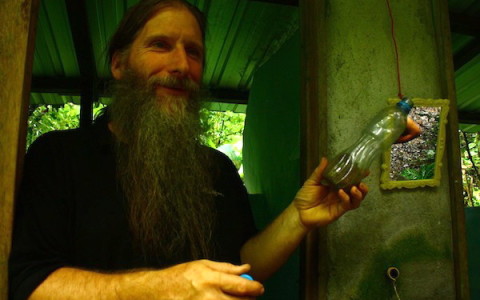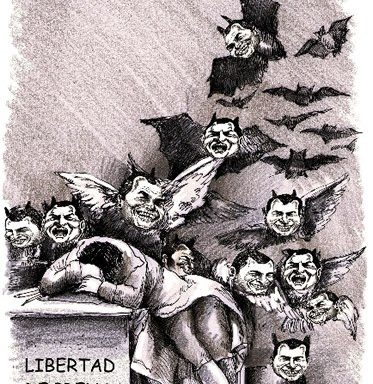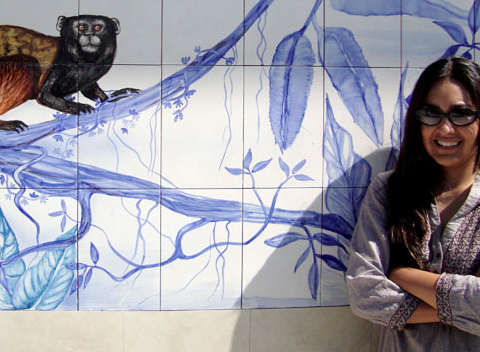
In the dense cloud forests that cover the western ridge of the Ecuadorian Andes an active guerrilla movement called the Pachamama Army roams.
Unlike other guerrilla armies further north inside this biodiversity hotspot biologists call the Tumbes-Chocó-Magdalena, this movement believes in non-violent struggle over violent subversion.
Their revolution is one of consciousness via connection with nature and they are armed to the teeth with seeds, saplings, and shovels instead of guns and shells.
“The Pachamama Army are the protectors of nature,” says the movement´s leader Geovani Yanchaliquin Basantez, an indigenous Andino Yachac (Andean Shaman) pictured below, “We hold life in its natural state with utmost respect and guard over the plant and animal species in danger of extinction.”
 Its a daunting task: Ecuador´s coastal cloud forests and humid montane forests are considered one of the most biodiverse hotspots on the planet, containing approximately 15-17-% of the world’s plant species and nearly 20% of its bird diversity.
Its a daunting task: Ecuador´s coastal cloud forests and humid montane forests are considered one of the most biodiverse hotspots on the planet, containing approximately 15-17-% of the world’s plant species and nearly 20% of its bird diversity.
Equally biodiverse are the Panamanian and Colombian sectors of the Tumbes-Chocó-Magdalena where armed conflict between paramilitary groups and the Colombian military against FARC and ELN guerrilla forces have prevented deforestation and protected the natural biodiversity.
The blowback with peace in Ecuador however has been devastating.
The violent visual representation below shows how Ecuador´s coastal forests have lost land at a rate faster than Palestine between 1938 and 1988 due to slash-and-burn farming, illegal logging, monocultures, and population growth.

Forward Operating Base “el Kade”

el Kade is the Pachamama Army´s most remote outpost and it´s under siege. A plague of African palm oil, cacao monocultures and banana plantations swallow the surrounding countryside like a cancerous green shaded desertification.
Rivers flowing from the snow-capped volcanoes east that were once the supply lines of life for the mountainside are now clogged with cow shit and silt. The green corridors that connected this small patch of tropical cloud forest and provided safe passage for nomadic animals have been cemented over by the unceasing march of civilization.
[quote]The coastal forest of Ecuador are the country´s lungs and source of water. The coast is sitting on the cliff of extinction and if we do not reforest now, we will be in danger of losing everything that inhabits this zone. – Geovani Yanchaliquin [/quote]

el Kade is one of three terrains entrusted to the Pachamama Army for protection. On the terrain there are 38 hectares of primary forest and 5 hectares of secondary, the two wooden cabins are off the grid and built with recycled wood, and all food consumed is grown organically on site.
But the remoteness of el Kade´s virgin forest is both a blessing and a curse: in times past its isolation saved it while illegal loggings lust for cheap timber chopped down all the low hanging fruit.
Now that Ecuador´s environmental laws have been tightened and are more strictly policed that same isolation entices the timber barons here because the law is harder to enforce.
[pullquote align=”right”]Check out the powerful Global Forest Disturbance Alert System that uses NASA satellite technology to track down deforestation.
“I’m hoping the tool can help journalists and activists pinpoint areas where deforestation is occurring,” says Rhett Butler, founder and editor-in-chief of Mongabay.[/pullquote]”To stop deforestation it is necessary to identify and denounce the threat when illegal logging is discovered.” says Geovanni who uses before and after photos taken by members of his small army on routine reconnaissance missions to measure deforestation. With enough proof they alert Ecuador´s Ministry of Environment to intervene as a regulator.
After preventing deforestation and planting saplings over baron pastures the Pachamama Army´s other priorities include educating local farmers on the benefits of organic farming over pesticide coated monocultures and creating a seed bank, “a seed bank is urgent because most ancestral plants are disappearing fast due to the deforestation and invasion of hybrid plants and grasses.”
“Ecotourism as a word means to arrive at a harmonious state between man and nature, and that for us is a way of life outside of marketing and capitalism.” says Geovanni who has also developed Reforestation Treks in conjunction with the Ecuador Tree People, “All of the economic income from ecotourism will be reinvested in works that favour nature.”
 It´s recommended that volunteers that want to work on these conservation projects to arrange to arrive at el Kade by mountain bike or horseback because by car it´s downright dangerous to get there.
It´s recommended that volunteers that want to work on these conservation projects to arrange to arrive at el Kade by mountain bike or horseback because by car it´s downright dangerous to get there.
Our 4WD Landrover almost slipped off the cliff lining the treacherous mudracked road and rope was tied around the tyres in a desperate attempt to give the car more traction. But it was worth the risk for views like this:

The Modern Day Shaman
For Geovanni the fight to save Ecuador´s coastal forests is also a fight to preserve his rich Kichwa heritage from being homogenised into the masses like a giant human monoculture.
The fast disappearing role of the Yachac or Shaman in the communal lives of the Kichwa´s and Andino´s that inhabit the Ecuadorian Sierra is especially troubling.

“The Shaman in the modern world plays a very important part in helping people return to their roots, to eat healthy and take natural medicine that doesn´t affect other parts of the body like chemical medicines.”
Geovanni learnt the secrets of Shamanic medicine from his father Victor Yanchaliquin, an indigenous medicine doctor and author of several books pertaining to medicinal plants.
This however is becoming increasingly rare in modern Ecuador where Spanish speaking Kichwa children cannot communicate in the Kichwa language to their grandparents.
In the 21st century the sacred ancestral knowledge that was once passed from generation to generation on the use and cultivation of medicinal plants is being lost as fast as the plants themselves.

“The wisdom of our ancestors tells us that we are already in difficult times,” says Geovanni, “but to conserve nature and our ancestral roots is our mission.”
When the mist grips el Kade it´s easy to get disoriented – when you´ve snorted water that´s been boiled with tobacco leaves and consumed half a litre of mescaline San Pedro cactus that disorientation expands time, place, and self.
On a full moon the clouds glow blue while the surrounding nature throbs with a kaleidoscope of calls from birds, mammals, amphibians, lizards, and insects. Hearing this call of life in its most pristine state is when you realise the importance of this beautiful living breathing organism all around us that sustains us and that are we are willing to sacrifice to make a quick buck.
[quote]”Pachamama in the Andean world is our mother, the spirit of nature, we are her children, and we have to fight to save her.” – Geovani Yanchaliquin[/quote][mc4wp_form]








